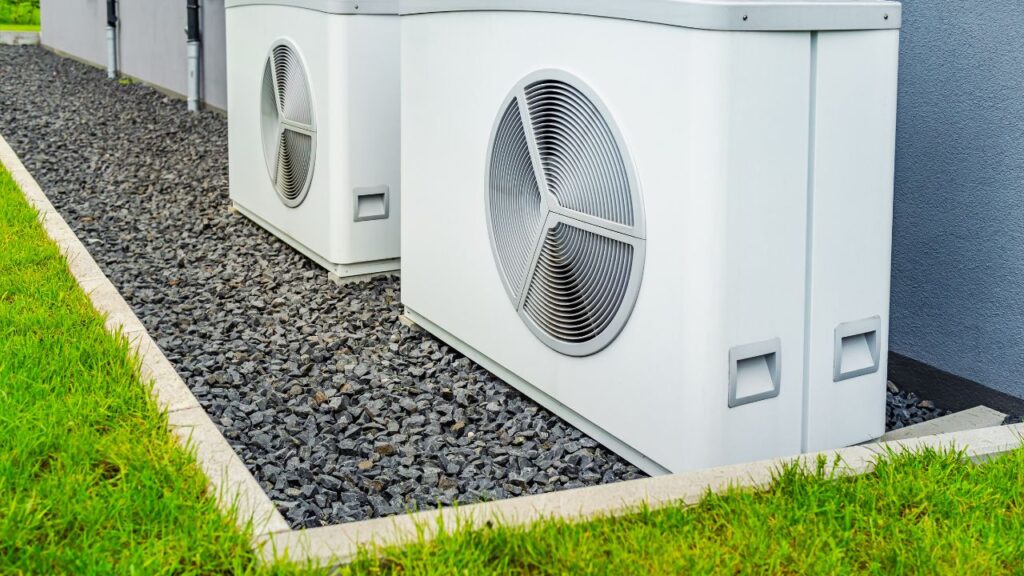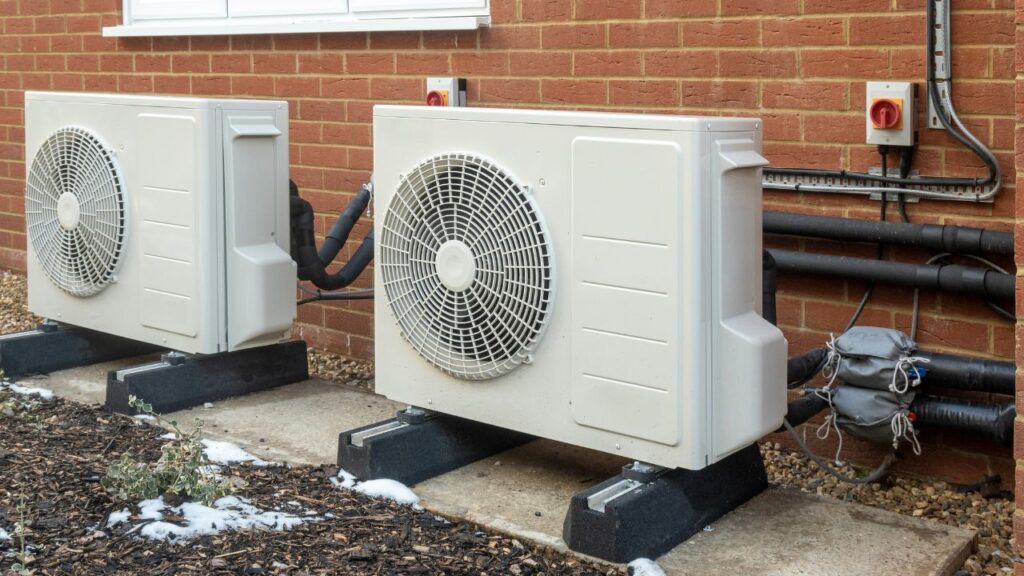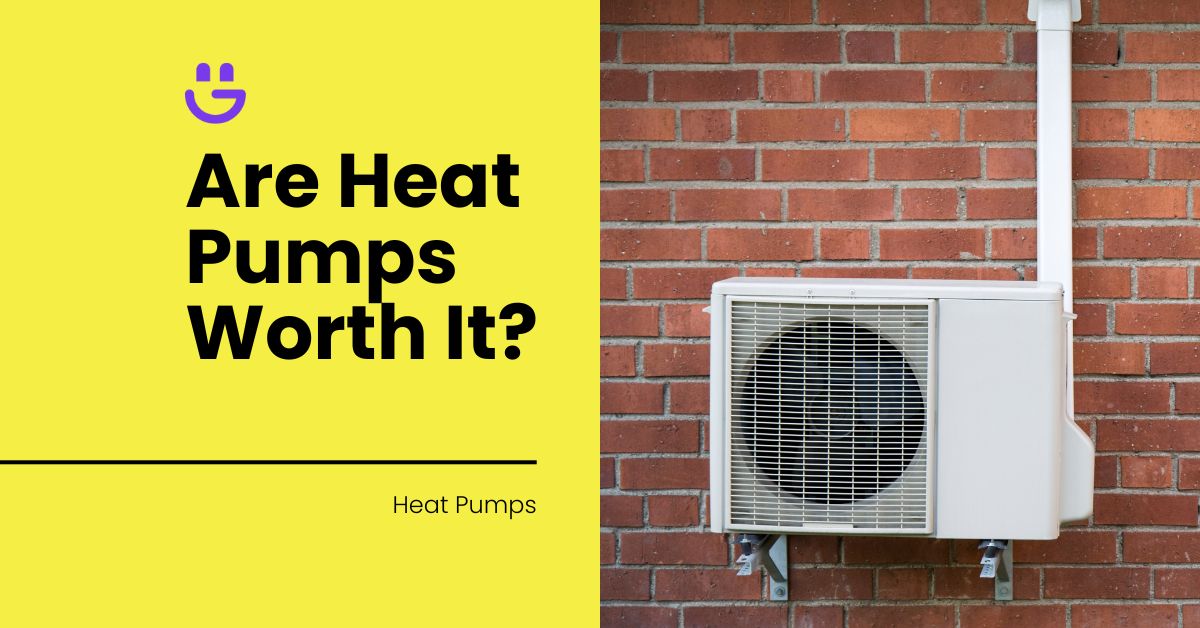Last Updated on June 9, 2025
To put it plainly, yes! Heat pumps are worth it, especially if you reside in the UK. A heat pump has many benefits, such as high-efficiency ratings, savings on gas bills, and they are low maintenance, all while meeting your carbon-free heating demands.
As of 2023, the UK had an estimated 220,000 heat pump installations. This figure is relatively low in comparison to other countries across Europe. You may be considering installing a heat pump, but be curious as to why they are not more common in the UK – and whether or not they are worth it. This guide will answer all your questions about the benefits, downsides, and potential costs of heat pumps.

Contents
Heat Pump Benefits
There may be some debate surrounding heat pumps. However, these systems are beneficial in many ways and are likely to see an increase in installation in the UK in years to come.
1. Saves costs on fossil fuels
Homes with central heating systems that use gas or oil can save an estimated £536 per year on gas bills by switching to a heat pump. Even hybrid pumps that use both an air source heat pump and a gas boiler will see a decrease in the burning of fossil fuels.
While heat pumps still consume fossil fuels through electricity, they do this in a significantly more effective and efficient way.
2. Efficient
Heat pumps are way more efficient at providing your property with heat. In fact, they are three times more efficient than gas boilers, even in the coldest months. Compared to traditional UK heating systems, such as gas boilers, heat pumps have a much higher efficiency rating.
Energy Saving Trust found that they are 300% more efficient, producing on average three times more energy than they take in. On the other hand, gas boilers have an efficiency of 85%, and oil burners 88%.
Air source heat pumps may be less efficient in extremely cold weather, but a ground source heat pump is consistent and efficient all year long. This is because a ground source heat pump extracts heat from the ground which has a more consistent temperature than the air.
3. Easy to use
Heat pumps are easy to use once installed and set to your liking. The user can operate the temperature controls manually or via an app, although many opt for the latter.
Maintenance on this kind of heating system is relatively low-key and only requires annual servicing by a qualified professional. The servicing includes:
- Inspection of the various indoor and outdoor components
- Pressure testing for leaks
- Treating and washing of coils (if required)
- Checking for noise and vibration
- Inspecting the condition of the isolation switch
- Checking fan wheel and motor for noise, balance and dust accumulation
- Washing and disinfecting indoor filters and coils
- Checking for insect or rodent nests in the outdoor unit
- Removing leaves or debris from underneath the outdoor unit
The servicing of a heat pump is quite thorough but is less intensive than the servicing of a gas boiler. Boilers require their internal parts to be inspected, cleaned and possibly replaced, as well as a power flushing to get rid of limescale buildup.
The maintenance of a gas boiler has far more things that need to be monitored, such as water softeners, magnetic filters, and central heating inhibitors. Boilers also require replacing every 10-15 years, whereas heat pumps last at least 20 years.
4. Eco-friendly
Heat pump systems rely solely onelectricity which means that they still consume some sort of fossil fuel. However, unlike gas boilers, heat pumps do not add to the emissions by burning fossil fuels and releasing harmful gases, resulting in much lower carbon emissions.
You also do not need to worry about the refrigerant used in heat pumps as this is a “low global warming potential” refrigerant.
5. Dual capabilities
Heat pump systems are beneficial throughout the year, no matter what the climate is like. They provide both cooling and heating as required. An air source heat pump, for example, can heat your home in winter and act as an air conditioner in summer.
6. Safer than gas boilers
If a heat pump is solely responsible for your heating needs, you do not need to worry about carbon monoxide poisoning, or overheating that could result in a fire or explosion (like you would for a gas boiler). Heat pumps are safe for the environment and safe for your home.
Disadvantages Of Heat Pumps
As with anything, there are some disadvantages to installing a heat pump in the UK. However, these should not deter you from having a heat pump installed as the long-term benefits and environmental impact are the selling points of this system.
1. Increase in electricity consumption
Heat pumps rely on electricity, so while you’ll be saving on your gas bills due to not using your gas boiler, you will likely see an increase in your electricity bill. For the average home, air source heat pumps use an estimated 3,286 kWh per year while ground source heat pumps use an estimated 2,804 kWh per year.
Given that electricity is more expensive than gas in the UK, there are special heat pump electricity tariffs offered as incentives to encourage installations. These tariffs offer cheaper rates per kilowatt (kW) usage directly associated with a heat pump as well as off-peak rates. For example, OVO’s Heat Pump Plus tariff allows you to run your heat pump for just 15p per kWh compared to the standard rate of 29p per kWh.
2. It may require a new central heating system
Existing central heating systems such as radiators may require replacement to be better suited to heat pumps. A heat pump is known as a “low-temperature system,” whereas a gas boiler is a “high-temperature system”. Older radiators were designed for water temperatures as high as 70 degrees Celsius, whereas the low-temperature heat pumps don’t require water above 45 degrees Celsius.
The surface area and material of the central heating system need to be suited to the low flow of heat that is emitted from the pump. The theory of heat transfer states that the rate at which warmth is transferred is directly proportional to the surface area of the object. This means that a heat pump will be more efficient when the heat is transferred onto a larger surface area.
This is why underfloor heating and larger radiators are considered ideal for heat pump systems, particularly a ground source heat pump. Aluminium radiators provide better heat transference from heat pump systems than cast iron or steel radiators.
3. Extensive planning is required ahead of installation
Depending on the heat pump system, intensive and sometimes complex planning is required before installation. A thorough inspection of the property is required to determine what needs to be done to ensure that the heat pump meets the heating demands of the household.
A ground source heat pump installation demands more planning, as excavation for the pipe network is required. The size of your property would be assessed to determine whether a horizontal or vertical system is suitable.
Poorly insulated homes, for example, will not allow for effective heating by the pumps and will require insulation before installation.
4. High upfront costs
The high upfront costs are probably the number one reason many people opt out of installing heat pumps. It is important to note that while these costs may be off-putting, heat pumps will save you money in the long term. The UK’s Boiler Upgrade Scheme is available to help with the installation costs for ground source and air source heat pumps.

Are Heat Pumps Worth The Investment?
The upfront costs of installing a heat pump system may be off-putting, but these units are worth the investment. Apart from the fact that you will be lowering your carbon footprint, you will be saving up to £340 per year on average on your energy bills.
Additionally, heat pumps will increase your property’s value. According to research conducted by the World Wildlife Fund UK, the value of your home could increase between 1.7% and 3% if you have a heat pump system. Furthermore, you could see a return on your initial investment in about 10 years.
Heat pump installation costs
The cost of installing a heat pump depends on various factors, such as property size, brand, heat demands and the type of system.
- The average cost of an air source heat pump is between £12,000 and £15,000. This accounts for the layout design and installation.
- Ground source heat pumps range in price from £16,200 to £49,000, which covers the installation and digging. Ground source heat pumps can either be installed with a horizontal or vertical duct system. The vertical system will be on the pricier side as it requires deeper digging and more labour.
- Hybrid heat pumps range between £7,000 and £15,000.
Government grants for heat pumps
As of 1st April 2022, UK residents can apply for the UK Government’s Boiler Upgrade Scheme. This grant pays £7,500 towards the installation of both air source heat pumps and ground source heat pumps – but does not cover hybrid heat pumps.
This scheme is only valid until 2028 and should be taken advantage of. Besides this, many suppliers offer incentives in the form of heat pump tariffs. These special tariffs offer off-peak and/or lower-than-standard electricity rates per kWh (heat pump consumption only) to those with heat pumps.
Are Heat Pumps Compatible With The UK Climate?
If you think that the UK climate accounts for the low number of installations, you’d be incorrect. According to the European Heat Pump Association, Norway has the largest number of air source heat pump users than any other country, and its average winter temperature is -6°C. Still wondering if heat pumps work in cold weather? Yes, heat pumps work in cold weather and are absolutely compatible with the UK’s climate.
FAQs
Why are heat pumps uncommon in the UK?
Costs are the primary reason for the low installation in the UK. Even with the government grant, some people feel that the installation cost, along with the higher electricity bill, is not worth it. However, it is important to remember that there are many incentives available for special heat pump tariffs that will reduce your annual electricity cost significantly.
Can heat pumps be installed in any kind of household?
Heat pumps can be installed in any kind of house, be it an old house or a flat. The property and structure would dictate which kind of pump is the best fit.
How much does a heat pump cost to run?
Without a special tariff, the average cost of running a heat pump is between £685 and £1,550 a year. This would vary according to the size of your home and your heating demands.
Do heat pumps require replacement or maintenance like boilers do?
Heat pumps require a yearly service and filter change. If any problems occur, the relevant component such as the coil will likely be replaced. However, unlike a gas boiler, it’s improbable that it would need to be replaced entirely.
Conclusion
Although the heat pump installation numbers in the UK are relatively low, 2023 saw an incredible 25% increase in installations. This proves that more people are seeing the benefits of installing a heat pump and that yes, it is worth it. Installing a heat pump benefits your home, your family, your future, and the earth.
The UK Government aims to have 600,000 heat pumps installed per year by 2028 as part of The Net Zero Government Initiative. The costs may be giving you pause but there are plenty of grants and incentives for those who want their heating demands met while reducing their carbon footprint.
Request a free air source heat quote from Eco Happy today.






James Elston
Boiler Expert
James Elston is the top boiler replacement and heating expert at Eco Happy. He has over 20 years of experience in the industry, focusing on Gas Safe boiler installations and offering home-heating and energy-saving solutions to homeowners across the UK. From sourcing the most energy-efficient combi boiler to providing specialist heating advice, James ensures that Eco Happy maintains the highest standards and best customer service.